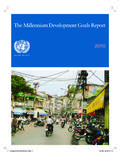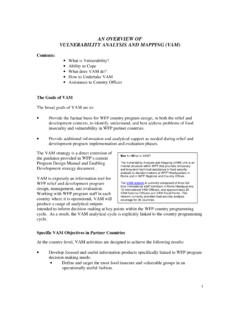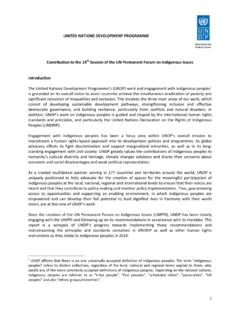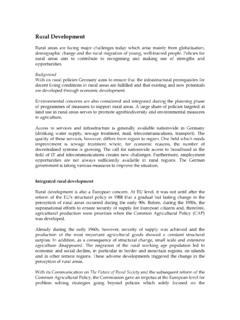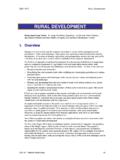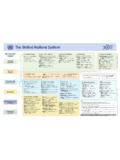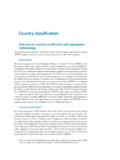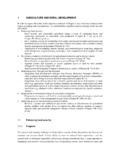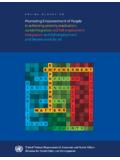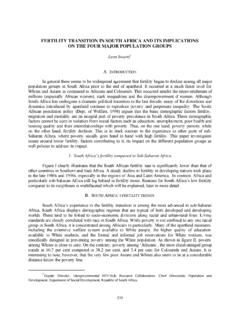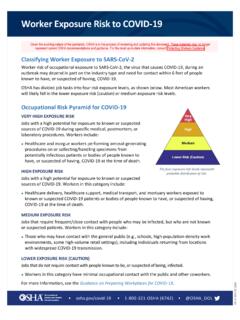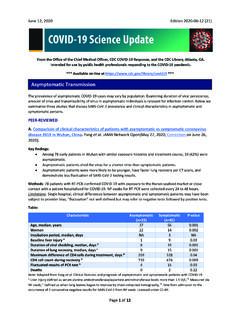Transcription of Responding to the socio-economic impacts of COVID-19
1 SHARED RESPONSIBILITY, GLOBAL SOLIDARITY: Responding to the socio - economic impacts of COVID-19 March 2020 TABLE OF CONTENTSI. INTRODUCTION ..1II. SUPPRESS TRANSMISSION TO STOP THE PANDEMIC AND SAVE LIVES ..3 III. SOCIAL, economic AND MULTIDIMENSIONAL impacts ..8 The effects on people and the formal and informal economy are devastating ..8 The impacts are complex and affect us all ..8 Implications for the 2030 Agenda and the Paris Agreement ..11 Political leadership and cooperation to combat COVID-19 ..11IV. SUSTAINABLE SOLUTIONS TO COPE WITH THE impacts ..13 A. Global measures to match the magnitude of the crisis ..13 B. Regional mobilization ..15 C. National solidarity is crucial to leave no one behind ..17V. PARTNERSHIPS TO ACCELERATE THE GLOBAL RESPONSE TO COVID-19 ..20VI. WE WILL OVERCOME THIS HUMAN CRISIS AND RECOVER BETTER ..22 SHARED RESPONSIBILITY, GLOBAL SOLIDARITY: Responding TO THE socio - economic impacts OF COVID-19 1I. INTRODUCTIONWe are facing a global health crisis unlike any in the 75-year history of the United Nations one that is killing people, spreading human suffering, and upending people s lives.
2 But this is much more than a health crisis. It is a human crisis. The coronavirus disease ( COVID-19 ) is attacking societies at their core. The IMF has just reassessed the prospect for growth for 2020 and 2021, declaring that we have entered a recession as bad as or worse than in 2009. The IMF projects recovery in 2021 only if the world succeeds in containing the virus and take the necessary economic In the face of such an unprecedented situation in recent history, the creativity of the response must match the unique nature of the crisis and the magnitude of the response must match its scale. No country will be able to exit this crisis report is a call to action, for the immediate health response required to suppress transmission of the virus to end the pandemic; and to tackle the many social and economic dimensions of this crisis. It is, above all, a call to focus on people women, youth, low-wage workers, small and medium enterprises, the informal sector and on vulnerable groups who are already at societies must come together.
3 Every country must step up with public, private and civic sectors collaborating from the outset. But on their own, national-level actions will not match the global scale and complexity of the crisis. This moment demands coordinated, decisive, and innovative policy action from the world s leading economies, and maximum financial and technical support for the poorest and most vulnerable people and countries, who will be the hardest hit. Given the world s extensive economic and social interrelationships and trade we are only as strong as the weakest health first step is to mount the most robust and cooperative health response the world has ever seen. Health system spending must be scaled up right away to meet urgent needs and the surge in demand for tests, expanded treatment facilities, adequate medical supplies and more health care workers; and for health system preparedness and response in countries where the virus has not yet manifested or where there is no community transmission to date.
4 The strongest support must be provided to the multilateral effort to suppress transmission and stop the pandemic, led by the World Health Organization (WHO), whose appeals must be fully met. Scientific collaboration in the search for a vaccine and effective therapeutics must be promoted through initiatives such as the WHO-sponsored solidarity trials. Universal access to vaccines and treatment must be assured, with full respect for human rights, gender equality and without second step is to do everything possible to cushion the knock-on effects on millions of people s lives, their livelihoods and the real economy. That means the direct provision of resources to support workers and households, provision of health and unemployment insurance, scale-up of social protection, and support to businesses to prevent bankruptcies and massive job losses. That also means designing fiscal and monetary responses to ensure that the burden does not fall on those countries who can least bear large-scale, coordinated and comprehensive multilateral response amounting to at least 10 per cent of global GDP is needed now more than ever.
5 This crisis is truly global. It is in everyone s interest to ensure that developing countries have the best chance of managing this crisis, or COVID-19 will 1 RESPONSIBILITY, GLOBAL SOLIDARITY: Responding TO THE socio - economic impacts OF COVID-19 2risk becoming a long-lasting brake on economic recover y. The third step is to learn from this crisis and build back better. Had we been further advanced in meeting the Sustainable Development Goals and the Paris Agreement on Climate Change, we could better face this challenge - with stronger health systems, fewer people living in extreme poverty, less gender inequality, a healthier natural environment, and more resilient societies. We must seize the opportunity of this crisis to strengthen our commitment to implement the 2030 Agenda and the 17 Sustainable Development Goals. By making progress on our global roadmap for a more inclusive and sustainable future, we can better respond to future crises.
6 The recommendations in this report are geared to empower governments and propel partners to act United Nations family and our global network of regional, sub-regional and country offices working for peace, human rights, sustainable development and humanitarian action, will support all governments, working with our partners, to ensure first and foremost that lives are saved, livelihoods are restored, and that the global economy and the people we serve emerge stronger from this crisis. That is the logic of the Decade of Action to deliver the SDGs. More than ever before, we need solidarity, hope and the political will and cooperation to see this crisis through RESPONSIBILITY, GLOBAL SOLIDARITY: Responding TO THE socio - economic impacts OF COVID-19 3II. SUPPRESS TRANSMISSION TO STOP THE PANDEMIC AND SAVE LIVESIn just 12 weeks, the outbreak of a novel coronavirus disease ( COVID-19 ) has gone from an initially discrete outbreak to a raging pandemic.
7 The COVID-19 outbreak has now affected over 199 countries and territories. As of 26 March, 416,686 confirmed COVID-19 cases have been reported to WHO, and 18,589 deaths, and this is just the tip of the iceberg. The disease causes respiratory infections of varying severity and is easily transmitted. Once an outbreak has entered the community transmission phase, it can double in scale every 3 to 5 days. Hospitalisation needs grow in leaps and bounds so fast that it can overwhelm a nation s healthcare system. On average, 20 per cent of those infected develop severe or critical symptoms with case fatality rates well over 1 per cent, and much higher with older age and for persons with underlying speed and scale of the spread, the severity of cases, and the societal and economic disruption has already been dramatic and could be more so as it takes hold in poorer nations. While there has been impressive progress with vaccine development for COVID-19 , with first trials initiated just 60 days after the genetic sequence of the virus was shared by China, a broadly available vaccine is not expected for the next 12 to 18 face different scenarios, requiring a tailored response depending on whether countries have no cases; sporadic cases; clusters; or community transmission.
8 Many countries can still act decisively through effective physical distancing, including 0040000400008000080000120000120000160000 1600002000002000002400002400002800002800 0032000032000036000036000040000040000044 0000 CasesChinaDeathsOutside China44000021-Jan30-Jan5-Feb13 - Feb20-Feb27-Feb6-Mar12-Mar21-Mar26-MarSo urce: WHOC umulative number of COVID-19 casesDaily new reported cases416,686 as of 26 March18,589 deathsF I G U R E 1: A FAST SPREADING GLOBAL PANDEMICSHARED RESPONSIBILITY, GLOBAL SOLIDARITY: Responding TO THE socio - economic impacts OF COVID-19 4quarantines, isolation and even lockdowns, testing and contact tracing to limit the further spread, and quickly suppress the transmission of COVID-19 . This must be the highest priority for all countries. It is the most effective way to save lives and protect the global economy. However, many countries do not have the resources to prepare themselves for the , urgent and coordinated action by all leaders of nations, businesses, finance, science and communities is needed to suppress transmission of the virus as quickly as possible and stop the UNITED NATIONS COMMITS TO WORKING IN ALL COUNTRIES AROUND THE FOLLOWING RECOMMENDATIONS: 1.
9 Act decisively and early to prevent the further spread or quickly suppress the transmission of COVID-19 and save livesAll countries must immediately scale-up the necessary actions to prevent, suppress and break the transmission, including to: \ Prepare and be ready, especially for those countries who have no or sporadic cases. \ Test and detect all suspected cases as rapidly as possible. This is vital to ensure the possibility of suppressing transmission and to optimize life-saving actions. \ Introduce measures such as quarantine, strictly restricting the movement of people, reducing person-to-person contact overall via work and school closures and physical distancing and educating communities about reducing spread through hand washing. \ Provide safe and effective clinical care to effectively isolate all COVID-19 cases, protect Health Care Workers (HCWS) and maintain essential medical supplies through effective supply chain management.
10 \ Share knowledge and develop and distribute new diagnostics, drugs and vaccines. It is crucial to learn from other countries, constantly assess and regularly update national strategies and guidelines to new knowledge. FIGURE 2: COUNTRY PREPAREDNESS CAPACITY FOR COVID-19 UNITED NATIONSThe boundaries and names sh own and the desi gnations use d on this map do not imply offici al endorse ment or acceptance by the United 2020 Source: WHO, OCHAC ountry pre pare dness capacity leve las of 6 Marc h 2020 Country with a Humanitari an Response Plan (H RP)12345 NodataSource: WHO, OCHAThe boundaries and names shown and the designations used on this map do not imply official endorsement or acceptance by the United RESPONSIBILITY, GLOBAL SOLIDARITY: Responding TO THE socio - economic impacts OF COVID-19 5 \ Take into full account the differentiated impacts on segments of the population, incorporate disadvantaged groups across all societies and adhere to the highest human rights standards.
